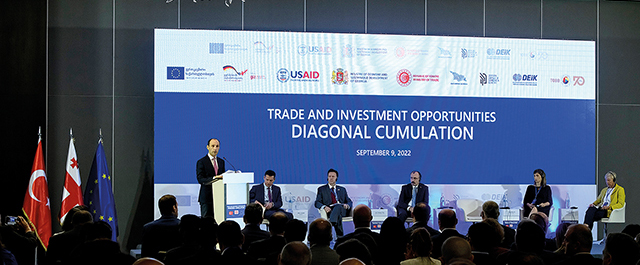The Free Trade Agreement has allowed Georgia to benefit from the Diagonal Cumulation between Georgia, Türkiye, and The European Union.
The Diagonal Cumulation mentioned in the title functions between more than two countries. As Georgia, Türkiye and the EU have established free trade regimes and recognize the same rules of origin for processing non-preferential raw materials, goods originating in Georgia will receive the benefits of preferential trade when imported into Türkiye or the EU. Further, goods originating in Türkiye and the European Union may be used to produce a final product in Georgia, and this product will be considered to have originated in Georgia. Note, this agreement applies only to non-agricultural products.
The USAID Economic Security Program and the Ministry of Economy and Sustainable Development of Georgia conducted research together with the development consulting company PMCG and revealed the most promising sectors and value chains that can benefit from the arrangement.
To discuss this important and complex matter, we reached out to Deputy Minister of Economy and Sustainable Development of Georgia Genadi Arveladze, research team leader and Sector Lead in Trade Policy at PMCG Mikheil Janelidze, and Georgian business representative and Manager of the Georgian Construction Materials Cluster Mariam Tsaishvili.
Arveladze told us that from April 29, 2021, due to the introduction of the diagonal cumulation between Georgia, the European Union, and Türkiye, it is possible to introduce export products made in Georgia using industrial raw materials and intermediate products imported from Türkiye to the European Union market under the free trade regime.
Accordingly, the diagonal cumulation creates many opportunities for those companies that want to export the products created using the attractive business environment of Georgia, and Türkiye raw materials, to the European Union with zero import tariff. This will be an additional incentive for investors to choose Georgia when looking for a location, even in cases when the import of raw materials and intermediate products becomes necessary. This will increase both investments and exports in general, and with the European Union in particular.
With the implementation of the Deep and Comprehensive Free Trade Agreement (DCFTA) with the European Union, a consumer market with a high purchasing power of 500 million with a free trade regime was opened for Georgian products.
If we look at the post-implementation results of the DCFTA, we can see that it has brought significant positive results. In particular, as a result of the successful agreement with the EU, this union represents a growing export market for Georgian products. Before the implementation of the DCFTA, Georgia origin products (export without re-export) constituted 68% of total export to the EU. Now this figure has increased by 21% and stands at an impressive 89%.
Arveladze also talked to us about how Georgia has made significant progress in the process of legislative convergence on trade and trade-related issues with the European Union. In general, based on the obligations stipulated by the DCFTA, according to today’s data, Georgian legislation was approximated to 60% of the EU legal acts envisaged by the DCFTA.
As a result, more and more harmless and safe products are appearing on the Georgian market. The quality of infrastructure is being consistently improved, the competitiveness of Georgian export products is on the rise and demand is up in the European Union and other countries, which contributes to the growth of exports. The customs procedures are further simplified, and are approximated to the customs legislation of the European Union. It is also worth noting that, this year, the EU procurement market was opened for local companies, which means that Georgian companies were given the opportunity to participate in tenders announced by the central bodies of the European Union.
Genadi Arveladze emphasized the importance of the forum on “Diagonal Cumulation between Georgia, Türkiye and the European Union – Trade and Investment Opportunities” held on September 9 with the support of the Ministry of Economy and Sustainable Development of Georgia, the USAID Economic Security Program and other international and local partners. B2B meetings between representatives of the private sector of Georgia and Türkiye were also held within the frames of the forum.
Arveladze also mentioned that Georgia is one of the leading countries in the world in terms of ease of doing business.
“Currently, products of Georgian origin can enter 1/3 of the world’s consumer market under the free trade regime, which represents a consumer market of 2.3 billion. Considering that operating costs in Georgia are significantly lower, we can say that investors in Georgia can easily and competitively gain access to the desired markets. Along with this, Georgia offers additional incentive mechanisms to investors in the manufacturing sector.”
This supports what Mikheil Janelidze said in a discussion of the research ‘Investment and Export Promotion Via Diagonal Cumulation Between Georgia, Türkiye and the European Union.’ He mentioned how, as part of the research, the team studied production factors of the selected products and considered the advantages and benefits Georgia provides for Türkiye: Factors like electricity, human capital, and taxes.
“Based on these factors, many Turkish companies have already moved their production to Georgia, mainly in the direction of textiles,” Janelidze noted. “Other sectors can follow this example and transfer their production to Georgia, which will be mutually beneficial, both for Türkiye, which will be able to increase their production and make it more efficient, and for Georgia, which means additional direct foreign investments, new knowledge, and technologies in production, inflows, new jobs, and increased exports.”
Janelidze added that the private sector can use the research results to develop specific business plans and determine the profitability of manufacturing products in Georgia.
He also lists value chains, industries and possible final products that, according to complex quantitative and qualitative research, have the greatest potential, such as plastic, aluminum, and cotton value chains. The study provides example products such as packaging materials, personal protective equipment (PPE), furniture, textiles, clothing, footwear, building materials, bicycles, vehicle parts, and household electronic appliances.
The research results match Mariam Tsaishvili’s personal forecast that she based on the existing business environment. In her opinion, as manager of the Georgian Construction Materials Cluster, in the first stage of diagonal cumulation, plastic and aluminum will be in highest demand.
“Today, Georgia does produce quality products, unfortunately,” Tsaishvili notes. “Quantity is not as high as it can be, but as a result of the Diagonal Cumulation, entering the EU market will contribute to improving the quality of Georgian enterprise. Bringing Georgian products into compliance with European Union standards and, accordingly, increasing competitiveness, will, in turn, ensure business stability and the perspective of the country’s economic development.”
While discussing the benefits of Diagonal Cumulation between Georgia, Türkiye, and the EU, Tsaishvili says that after receiving the certificate of origin, companies will enjoy tax benefits, and the production price will become even more competitive in the international market.
“This will encourage the diversification of manufactured products, and, in the long run, it will contribute to the creation of new Turkish-Georgian enterprises.”














